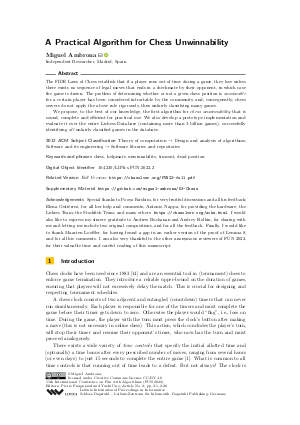@InProceedings{ambrona:LIPIcs.FUN.2022.2,
author = {Ambrona, Miguel},
title = {{A Practical Algorithm for Chess Unwinnability}},
booktitle = {11th International Conference on Fun with Algorithms (FUN 2022)},
pages = {2:1--2:20},
series = {Leibniz International Proceedings in Informatics (LIPIcs)},
ISBN = {978-3-95977-232-7},
ISSN = {1868-8969},
year = {2022},
volume = {226},
editor = {Fraigniaud, Pierre and Uno, Yushi},
publisher = {Schloss Dagstuhl -- Leibniz-Zentrum f{\"u}r Informatik},
address = {Dagstuhl, Germany},
URL = {https://drops.dagstuhl.de/entities/document/10.4230/LIPIcs.FUN.2022.2},
URN = {urn:nbn:de:0030-drops-159721},
doi = {10.4230/LIPIcs.FUN.2022.2},
annote = {Keywords: chess, helpmate, unwinnability, timeout, dead position}
}

 Creative Commons Attribution 4.0 International license
Creative Commons Attribution 4.0 International license

